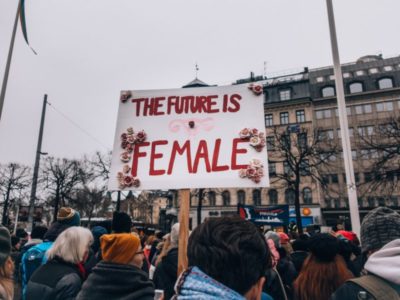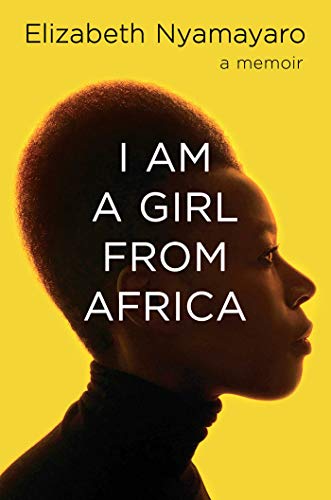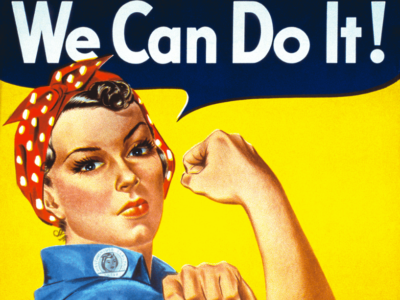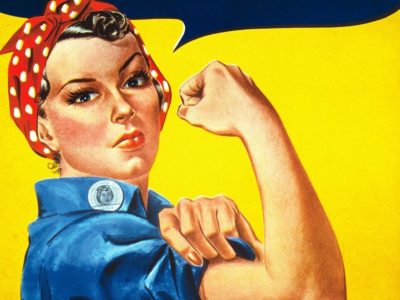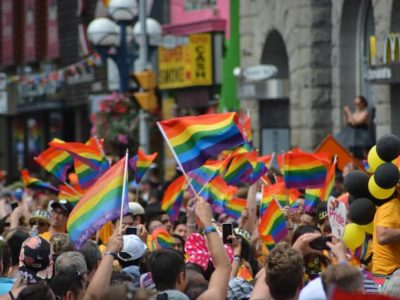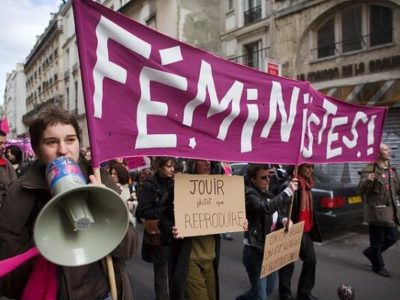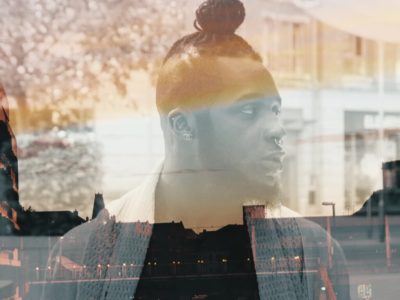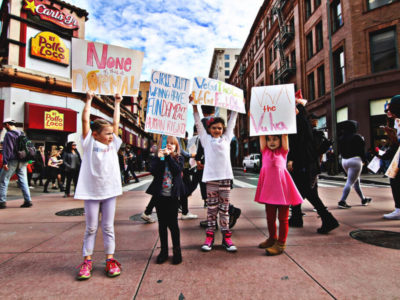The future is female, and so is the present. Whether you eat books for breakfast before class or love to see girls make a stand, check out these recent books by and about women. Women continue to break the expectations laid out for us and carve the path for future girls to thrive; then, they live to tell the tale. From moving memoirs to lively fantasy, we’ve collected a diverse range of girl power stories for you to add to your reading list.
Let’s celebrate the stories of some inspiring women who define girl power:
1. Becoming by Michelle Obama
Being the first African American to become FLOTUS, Michelle Obama’s coming-of-age story fills many readers with awe. From her humble childhood in Southern Chicago to her balancing act of motherhood and First Lady commitments, Obama walks us on the tightrope of her life with detailed storytelling and transparency.
“Going into this book was a breath of fresh air; getting to know her as a human being, rather than a one-dimensional figure,” UCLA alumni Sabrina Lee said. “The way she writes is really thoughtful; the way she expresses herself, the way she tries to objectively lay out the foundation of her life and takes us on in her mind to tell us how the events unfolded for her is really well written.”
Every reader carving their own path and facing their own challenges will find something to love in her journey of becoming. As a book by and about an iconic woman who challenges society’s every expectation, you will not want to leave Becoming off your reading list.
“For me, becoming isn’t about arriving somewhere or achieving a certain aim. I see it instead as forward motion, a means of evolving, a way to reach continuously toward a better self. The journey doesn’t end.” —Michelle Obama in Becoming.
2. The Moment of Lift: How Inspiring Women Changes the World by Melinda French Gates (2019)
Written by the co-chair of one of the largest global philanthropies, Melinda Gates’ The Moment of Lift paves the way towards inspiring girls to make the world a better place. Gates takes her opportunity as a white upper-class millionaire to stand on the soapbox and advocate for women’s empowerment without hesitation.
“I was really skeptical because the Gates foundation is really huge in the development space,” UCLA alumni Toffy Char said. “Having a development background, I just thought ‘It’s another rich woman writing about kids in Africa, does she really understand what she’s getting into?’ However, I thought her book was good because she understood her privilege. There’s so many bad practices with rich people going in and quote-on-quote ‘saving people,’ but she understood that and addressed those criticisms.”
Gates’ painting of women’s stories and struggles makes the picture clear: supporting girls everywhere and uprooting the old system of gender inequality will change the world. If you’re looking for ways to get involved in women’s empowerment, this is your book!
“[I]f you know you got the better deal, then you have to be humble, and it hurts to give up your sense of superiority and say, ‘I’m no better than others.’ So instead we invent excuses for our need to exclude. We say it’s about merit or tradition when it’s really just protecting our privilege and our pride.” —Melinda French Gates in The Moment of Lift
3. Know My Name by Chanel Miller (2019)
Do you know her name? In 2016, a victim of sexual assault under the alias “Emily Doe” read a powerful letter to Stanford athlete and perpetrator Brock Turner that forever changed the way California courts view sexual assault. Her trial and letter made waves in the media and moved more victims of campus sexual assault to come out with their stories. Years later, she revealed her identity as writer and artist Chanel Miller and dropped her full account, Know Your Name, shining the spotlight on our justice system that favors the criminal.
“There were so many good points in this book, but I think the biggest takeaway for me was reframing herself from ‘the victim’ to a survivor,” UCLA alumni Fair Pisuttisarun said. “When you think of victims of sexual assault, you see people hiding behind closed doors and cloaked under anonymity. For her to come out and give her perspective in a way that’s so genuine without pointing fingers, I think that was really powerful.”
After reading this memoir of raw emotion mixed with humor, you won’t forget her name and story.
“We don’t fight for our own happy endings. We fight to say you can’t. We fight for accountability. We fight to establish precedent. We fight because we pray we’ll be the last ones to feel this kind of pain.” —Chanel Miller in Know My Name
4. I Am a Girl from Africa by Elizabeth Nyamayaro (2021)
Elizabeth Nyamayaro, survivor of a Zimbabwe drought, tells the story of how a UN aid worker’s bowl of porridge saved her life and inspired her to become someone who gives back. She recounts her path from dancing with death all the way to becoming the leader of HeForShe, the UN Women’s gender equality solidarity campaign. Throughout it all, Nyamayaro drives home the message of ubuntu, or “I am because we are,” as well as the importance of passing down the bowl of porridge. A great read if you’re seeking a look into the experience of a female humanitarian!
“She squeezes my hand and smiles. ‘I am here to feed hungry children in the village, because as Africans we must uplift each other.’ I don’t understand what it means to uplift others, but I nod. I know that I can finally stand up. I will search for food. I will live.” —Elizabeth Nyamayaro in I Am a Girl From Africa
5. My Broken Language: A Memoir by Quiara Alegría Hudes (2021)
Who better to tell you a story with beautiful language than a playwright? Quiara Alegría Hudes, writer of In the Heights and Pulitzer Prize-winning play Water by the Spoonful, tells the story of her search for her voice as a Latina girl in Philadelphia. Living on the boundary between American and Puerto Rican culture, Hudes desired to amplify her family’s sacred stories in the way she knew best: as an artist in her own language. Her tale of reaching for the heights and becoming a playwright who weaves breathtaking stories aligns with anyone who yearns for the moment they find their own calling.
“Maybe that’s what mom had meant when whisper-urging me, ‘It’s in your blood – the resilience, the deep memory and experience of survival.” —Quiara Alegría Hudes in My Broken Language: A Memoir
6. Black Girl Unlimited: The Remarkable Story of a Teenage Wizard by Echo Brown (2020)
The story of a young, Black female wizard… but don’t be fooled by the magic. A unique autobiography that mixes magical realism into true events of racism and sexism, Black Girl Unlimited tells the story of Echo Brown, who lives with her family in the humble East Side but begins attending a rich school of wizards in the West Side. As she travels from the east to the west on the daily, Brown discovers a world of pain and discrimination waiting on the other side. Along the way, she learns heavy yet invaluable lessons about trauma and survival.
“I think a lot of times, when you go through this kind of trauma, you don’t see the light at the end of the tunnel,” author of Black Girl Unlimited Echo Brown said. “It doesn’t feel like it’s ever going to end, like you’re going to be trapped in this kind of terror forever. If I had to pick one lesson to walk away with [from Black Girl Unlimited], it would be that it’s survivable. You have to do the healing work, but once you do the work it all becomes more survivable and you’re able to transcend this kind of suffering and pain you think you can’t transcend. That’s really the lesson of my life.”
Warning: you might find yourself wiping tears off your cheeks by the end. Yes, even in a book with magic and wizards.
“The tenth lesson of wizard training is to pay attention to warning signals in your life. Become alert to what the universe is trying to point you away from. If you can wake up fast enough, certain tragedies (though not all) can be avoided. And for those times when you don’t manage to wake up fast enough, be kind to yourself in the storm that will follow.” —Echo Brown in Black Girl Unlimited
7. Girls with Sharp Sticks by Suzanne Young (2019)
A twisted version of our reality, this dystopian novel follows Philomena Rhodes and her friends at The Girls of Innovations Academy, where their Guardians closely monitor and pamper them to be compliant young women without a single ounce of autonomy.
“One thing that always bothers me is how society treats teenage girls as a commodity. They’re supposed to be poised and well-behaved. Even in a school situation with school uniform violations and how unjust they are; as a teacher, I had to fight against my own school about this ridiculousness of ‘distracting boys’ with bare shoulders,” author of Girls with Sharp Sticks Suzanne Young said.
Is this elite life really what it seems, though? The girls discover some troubling secrets about the academy that say otherwise, as well as capabilities within themselves that their Guardians kept buried. Keep yourself on your toes in this chilling novel as the girls with sharp sticks make a stand.
“There’s a lot of women and girls that don’t feel supported in society. I think they feel that loneliness that some of the characters [in Girls with Sharp Sticks] felt being isolated in that academy. To me, I was trying to reach out to girls who needed that extra bit of strength to stand up against the things that were oppressing them. To let them know that their voices can get louder, and it helps when you can find other people to help you do that. I find that a book can inspire people to act,” Young said.
“When math was pushed aside for myth
The little girls adapted.
They gathered sticks to count them learning their own math.
And then they sharpened their sticks.”
—Suzanne Young in Girls with Sharp Sticks
**This book is the first in a three-part series.**
8. The Girl with the Louding Voice by Abi Daré (2020)
Narrated entirely in colloquial English, this story follows 14-year-old Adunni as she grows up in a Nigerian village. Adunni, cursed at birth to live a life of poverty by her racial and class background, seeks to find her voice and speak up for herself. She desires a way to break out of this bleak future that life set for her and other girls who share the same fate. Her way of doing that: getting an education, despite all the odds stacked against her. Adunni’s development as she finds her voice will send you on an emotional rollercoaster of laughs, tears and speechlessness.
“’My mama say education will give me a voice. I want more than just a voice, Ms. Tia. I want a louding voice,’ I say. ‘I want to enter a room and people will hear me even before I open my mouth to be speaking. I want to live in this life and help many people so that when I grow old and die, I will still be living through the people I am helping.’” —Abi Daré in The Girl with the Louding Voice
9. Off the Record by Camryn Garrett (2021)
If you crave LGBTQ+ representation, this book features a bisexual protagonist! 17-year-old writer Josie Wright finds the opportunity of her life when she wins a contest to write a celebrity profile on up-and-coming actor Marius Canet. She travels and meets big shots in the acting industry. However, an actress discreetly tells her a story that turns her trip around: a director who abuses Hollywood women and gets away with it. Wright holds the perfect position to expose his crimes to the world. However, Wright finds herself conflicted between revealing a story of sexual abuse and keeping silent to protect her and other women’s careers. You’ll fall in love with this modern story of journalism, female empowerment and #MeToo.
“I want to make things and be seen and understood, at least by a few people. What girl doesn’t want that? What person doesn’t want that?” —Camryn Garrett in Off the Record
10. The Invisible Woman by Erika Robuck (2021)
History majors might already know about the WWII spy Virginia Hall, but have you read her story in the form of a historical fiction? As a woman who yearned for more than the security of home, Hall left Maryland and found recruitment in Europe as the first female spy for the French Resistance. Even after an accident that left her with the nickname “The Limping Lady” and a devastating first mission, Hall determinedly faces her current mission: assist with supply drops and send wireless transmissions back to headquarters without getting caught by the Nazis.
“Virginia Hall is someone who faced ‘no’ a lot. I think a lot of women in particular hear ‘no’ a lot. Yet she didn’t let it get her down, even when she was told they didn’t want her in the foreign service because of her disability,” author of The Invisible Woman Erika Robuck said. “She didn’t take no for an answer, and went and did what she could to get her to where she needed to go. Every time someone said ‘no’ to her, she would go to a new office in a new country and make new contacts and friends. So she didn’t let it stop her; in any circumstance, she worked with the tools that she had to make it work for herself.”
Despite her pain and regrets, Hall finds her passion in fighting against Nazi oppression in hopes of avenging lost lives.
“Writing about her during the pandemic helped to put my life in perspective where I might have felt like I wanted to feel hopeless and upset about the state of the world. Just looking at the lives of people who helped out in her network and what they were going through gave me perspective and allowed me to be thankful for my blessings, rather than lamenting what I couldn’t do. Her continuing on in spite of all ‘no’s and seemingly impossible circumstances and achieving success was greatly inspirational to me,” Robuck said.
Even if you’re not the biggest fan of history class, The Invisible Woman recounts Hall’s resistance with storytelling that will make you admire the female change makers of the past.
“It’s not the fists alone that win the fight.” —Erika Robuck in The Invisible Woman

